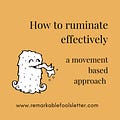Ruminating begins for me in my guts. This checks out. Ruminate comes from Latin ruminatus, the past participle of ruminare ‘to chew the cud,’ also, related to the word ‘gullet’.
It’s quite normal to brood, to fester, to ruminate. Sometimes, interrupting rumination is the best path forward. A circular rut of rumination is an easy hole to fall into.
There are other times when it can help to ‘run the dogs out’. My ruminations can be like an eager and insistent puppy from a working breed. They need their time.
Just as they want to GO! I want to SPIN!
The desire to ruminate, to spin festers from inside my stomach. Sure my head is spinning, but the ruminations? They are a physical experience with a story. Notice how ruminating, turning things over, spinning - descriptions of the experience are all physical, movement adjectives and adverbs.
Ruminating seems straight forward, it seems to have a direction. And yet, they always seem to turn back in on themselves. Some have described their as ‘a do…
Keep reading with a 7-day free trial
Subscribe to The Remarkable Fools Letter to keep reading this post and get 7 days of free access to the full post archives.


